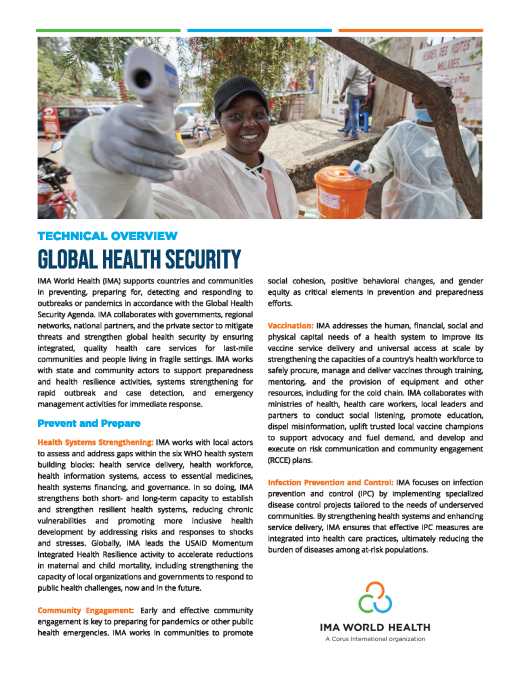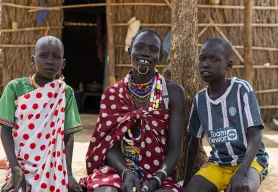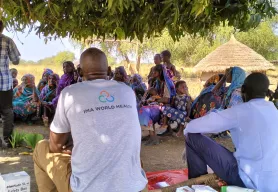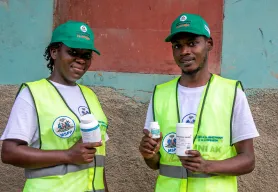The humanitarian situation in South Sudan remains dire with nearly 70 percent of the population in need of humanitarian assistance. The country is among the worst globally on key health performance indicators as it faces a catastrophic food crisis. Around 75 percent of all child deaths are due to preventable diseases, such as diarrhea, malaria and pneumonia. Neglected tropical diseases (NTDs) are endemic in the country. Devastating flooding, political instability and COVID-19 have exacerbated the crises and threatened lives and livelihoods across South Sudan. Over 2 million people remain displaced.
IMA World Health (IMA) has a major role in the development of the health care system in South Sudan. Since 2008, IMA has been working with South Sudan’s nascent government ministries, international and national partners, and other health organizations to strengthen the health system’s capacity to deliver high-quality essential health care services, implement community-based HIV/AIDS prevention interventions, and improve maternal, neonatal and child health outcomes. Even after the violent conflicts that began in 2013, IMA continued working with the local government and primary health care providers state-wide in Upper Nile and Jonglei to facilitate service delivery and emergency response. Despite ongoing and ever-changing challenges, IMA and our local partners have continued to support hundreds of thousands of people across South Sudan.
Project Highlights
IMA World Health leads the five-year, USAID-funded MOMENTUM Integrated Health Resilience program, which is part of a suite of innovative MOMENTUM awards designed to holistically strengthen quality maternal, newborn, and child health in host countries around the world including South Sudan, DRC, Burkina Faso, Mali, Niger, Sudan, Tanzania and Yemen. Working alongside local organizations, governments, and humanitarian and development partners in fragile settings, the project helps accelerate reductions in maternal, newborn, and child illness and death by increasing the capacity of host country institutions and local organizations—including new and underutilized partners—to introduce, deliver, scale up, and sustain the use of evidence-based, quality care.
In South Sudan, IMA supports Expanded Program on Immunization (EPI) activities through maternal and child health services offered at health facilities and mobile clinics in three states. The child health services the program delivers are in line with the curative and preventive principles outlined in the Basic Package for Health and Nutrition Services (BPHNS). These efforts extend to both health facilities and communities, leveraging the boma health worker initiative and community outreach programs to improve immunization coverage.
With USAID/BHA support, IMA delivered integrated health, nutrition and WASH services that target vulnerable internally displaced people (IDPs) and host communities in four counties in Jonglei State (Ayod, Nyirol, Fangak, and Canal/Pigi). Basic health care, clean water and household items were priority needs for the IDP and host communities where ongoing conflict, coupled with extreme flooding and drought, exacerbated needs among these risk-prone populations. Such populations faced severe adverse effects due to income insecurity, inadequate sanitation practices, and limited access to protection, water and health services. These challenges resulted in devastating outcomes such as death, diseases (such as malaria, acute respiratory tract infections and diarrhea), and psychological distress. Women, children and youth were disproportionately impacted. IMA reached populations where they settled, establishing mobile health clinics to 1) improve access to essential health services; 2) improve the nutritional status of pregnant and lactating women (PLWs) and children; and 3) provide target populations with access to safe drinking water, sanitation and hygiene services.
With the conclusion of the JESI project, IMA continues to support IDPs, host communities, and returnees across 16 bomas in the fragile contexts of Ayod, Nyirol, Fangak, and Canal/Pigi through the JESI Plus project. IMA deploys mobile outreach teams to deliver vaccines, enabling on-site immunization and surveillance for vaccine-preventable diseases.
In August 2020, severe flooding in South Sudan’s Ayod County displaced families, disrupted lives and livelihoods and severed access to markets and humanitarian services. Many affected were vulnerable IDPs already facing acute food insecurity and malnutrition. IMA had implemented emergency nutrition interventions targeting IDPs and host communities in Ayod County since 2017. After becoming a permanent partner of Lutheran World Relief (LWR) under the Corus International family of organizations, IMA combined its expertise in nutrition programming with LWR’s proven ability to strengthen rural livelihoods in South Sudan. The LOSIH project took this integrated approach to provide the resources and skills needed to both reduce severe and moderate acute malnutrition in children under five as well as to expand income-generating opportunities for households through nutrition-sensitive agriculture interventions focusing on kitchen gardening, fishing, and post-harvest handling.
By partnering with the END Fund, IMA strengthened local health systems to support VL prevention, treatment and control in South Sudan. VL, also known as kala-azar, is a debilitating, and if left untreated, fatal neglected tropical disease (NTD) that over two million people are at risk of contracting across South Sudan. IMA advanced local leadership by supporting 25 health facilities in the four disease-prevalent states through the provision of medication and diagnostics, training health care workers on VL identification and treatment, and deploying community health volunteers to promote awareness and local engagement. In support of the government’s national VL strategy, IMA bolstered local capacity for health facility management, improved integration of VL services into the primary health care system, facilitated national and state joint planning for VL control, established lab-based surveillance and data-sharing strategies, and improved case detection through rapid testing.
Funded by USAID's Bureau for Humanitarian Assistance (BHA) and led by Tearfund, the ESIR II project implemented a multisectoral, integrated response to improve access to essential health and nutrition services, food security, protection of women and children, WASH and agriculture food security services among returnees, IDPs and host populations in Central Equatoria State. In partnership with local actors, IMA World Health operationalized non-functional county health facilities and established mobile outreach teams, providing emergency and essential services through 6 fixed health facilities and 3 mobile health facilities to reach both settled and highly mobile populations. In addition to training staff on COVID-19 prevention and response, outreach work through community health workers raised awareness of health provision, health promotion, social and behavior change, and how to sustainably manage key health infrastructure. Furthermore, IMA World Health facilitated a referral network to improve access to specialized care through the provision of transportation to hospitals in South Sudan and Uganda. ESIR II services targeted 43,273 individuals, including 38,178 IDPs, residing in Morobo, Kajo-Keji and Lainya Counties.
IMA served as the lead agent for the primary health care activities the World Bank funded in South Sudan pre and post-independence. IMA worked closely with UNICEF and the Ministry of Health to identify recipient PHCCs and train health care personnel in EPI related activities. IMA and project partners co-funded both routine and outreach EPI activities, including the establishment and funding of annual ‘dry season campaigns’ in difficult to reach counties and payams in Jonglei and Upper Nile States. This included mapping cattle camps and bringing mobile teams by vehicle or boat for catch-up vaccination of children.
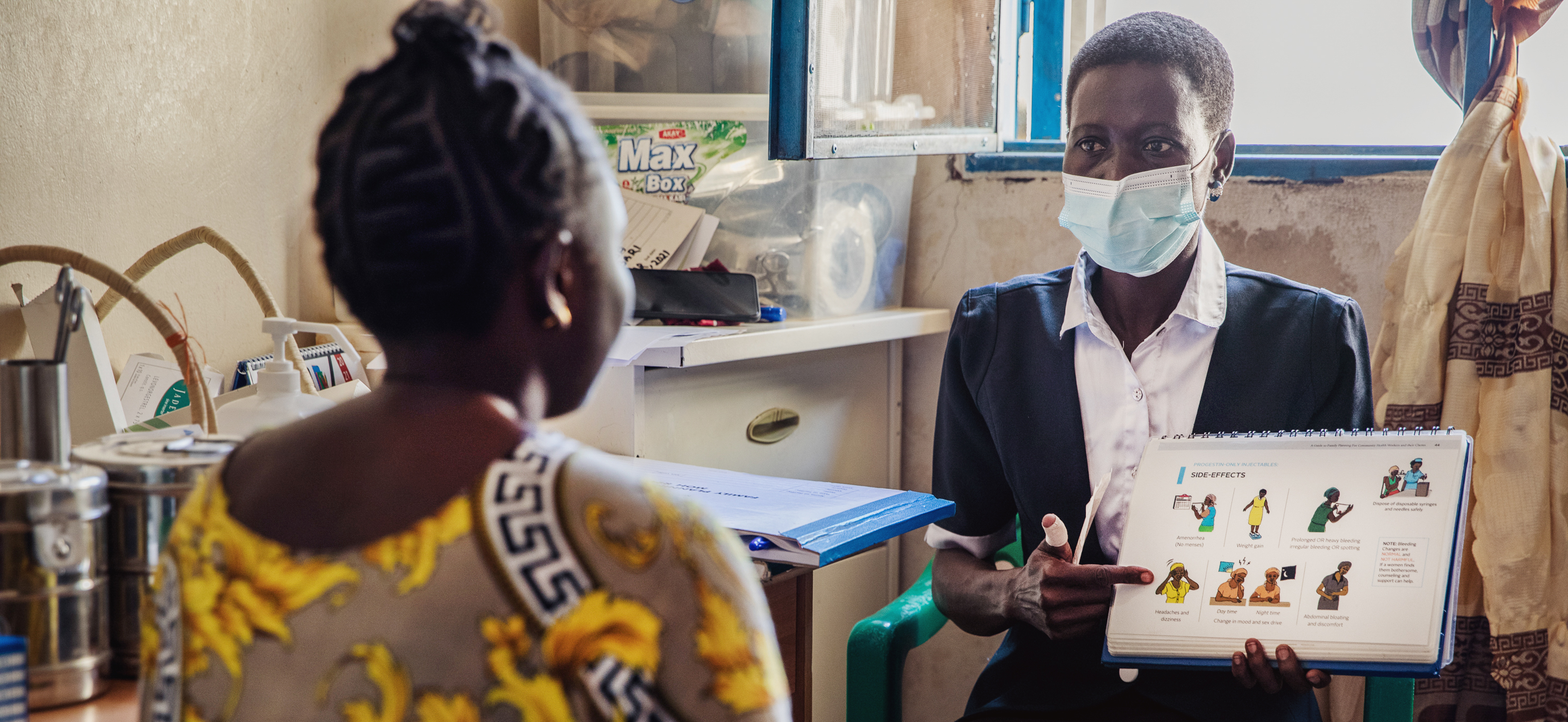
The Corus Effect
Founded in 1960, IMA World Health is part of Corus International, an ensemble of long-serving, global leaders in international development and humanitarian assistance committed to ending poverty and building healthy communities across Asia, Latin America and the Caribbean, the Middle East, and Africa.
In addition to IMA World Health, the Corus family includes global aid and development organization Lutheran World Relief, U.K.-based technology for development company CGA Technologies, impact investing firm Ground Up Investing, and direct trade company Farmers Market Brands.
Alongside communities and local partners in fragile settings, our dedicated experts across our organizations integrate disciplines, approaches and resources to overcome global health challenges, develop productive and stable economies, improve resilience in the face of climate change, and respond to natural disasters and humanitarian crises. We invest in solutions that are innovative, scalable, holistic and move the needle towards transformational change.





